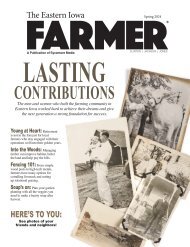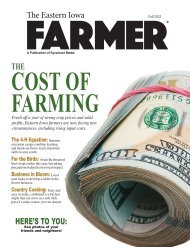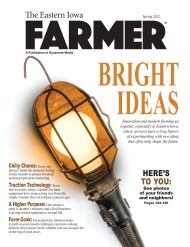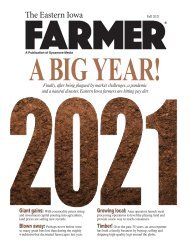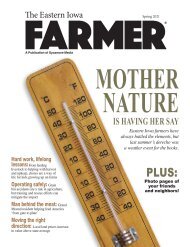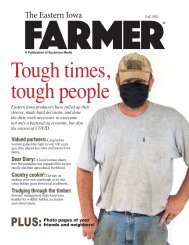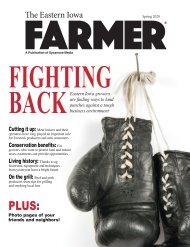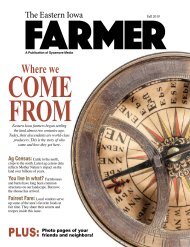Create successful ePaper yourself
Turn your PDF publications into a flip-book with our unique Google optimized e-Paper software.
WHY FARMERS MATTER<br />
calls from around the<br />
country from people<br />
interested in getting a<br />
chunk of that well-maintained<br />
dirt.<br />
For Ruden, the hard<br />
part was giving up work<br />
with the Abbey’s prize<br />
black Angus herd.<br />
“I really miss them,” he<br />
said.<br />
The monks started renting<br />
their 2,000 acres of<br />
cropland to two farmers,<br />
Charles McCullough and<br />
Kenny Hosch, on a cashrent<br />
basis. In exchange<br />
for use of that dirt, the<br />
renters must also follow<br />
Dave Ruden’s life work<br />
combines agriculture<br />
and conservation.<br />
EASTERN IOWA FARMER<br />
PHOTO / BROOKE TAYLOR<br />
strict covenants limiting<br />
anhydrous, Roundup and<br />
genetically-modified crop<br />
use. Ruden explained that<br />
he often serves as a liaison<br />
between the monks<br />
and the outside world, a<br />
buffer of sorts.<br />
Speaking of buffers,<br />
conservation practices are<br />
evident everywhere in the<br />
farm — contours, riparian<br />
buffers, grass strips,<br />
prairie patches. There are<br />
800 acres of cover crops<br />
on the abbey grounds.<br />
They’re experimenting<br />
with pollinator plots.<br />
Meanwhile, the<br />
Dubuque County SWCD<br />
is holding evening classes<br />
on cover crops. Ruden<br />
said there’s definitely a<br />
learning curve to them.<br />
Some farmers are working<br />
with planting in the<br />
middle of a rye cover<br />
crop field. Others crimp<br />
the rye down but let it lie<br />
in the fields.<br />
All this builds up organic<br />
material and the capacity<br />
to retain nitrogen<br />
in the soil year-round.<br />
“Most guys are treating<br />
plants,” Ruden said. “If<br />
you treat the soil like a<br />
living thing, the plants’ll<br />
take care of themselves.”<br />
He acknowledges that<br />
high machinery costs<br />
can crimp cover crop<br />
plantings but argues that<br />
it’s worth it whenever<br />
possible.<br />
“The only resource<br />
you can’t replace is your<br />
soil,” he said.<br />
Driving the abbey<br />
property shows the scale<br />
of the place. Besides the<br />
cropland, there’s 1,400<br />
acres in timber. Some<br />
of that timber goes into<br />
Trappist caskets, which<br />
have brought the monks<br />
a new income.<br />
The monks started out<br />
with just 500 acres, along<br />
with a cow and a mule,<br />
Ruden explains, but they<br />
bought up surrounding<br />
lands from fellow Irish<br />
immigrants when many<br />
left to serve in the Civil<br />
War. The land is steeped<br />
with stories and tradition:<br />
on one country road<br />
corner, a perfectly maintained<br />
(and regularly used)<br />
ball diamond takes up the<br />
“richest land on the farm,”<br />
Ruden joked. Two patches<br />
of trees with mowed<br />
benches like a park rise<br />
from corn and bean fields.<br />
That’s where the monks<br />
used to stop to water their<br />
mules, Ruden said.<br />
“As long as I’m here,<br />
they won’t be plowed,”<br />
he said.<br />
Catfish Creek starts on<br />
the New Melleray property<br />
and flows through<br />
Swiss Valley Park, the<br />
Mines of Spain, ag land<br />
and urban development<br />
before meeting the<br />
Mississippi. As such, it<br />
provided an opportunity<br />
for the city of Dubuque,<br />
Dubuque County and the<br />
soil and water district<br />
to work together. The<br />
watershed has a generous<br />
75 percent costshare on<br />
conservation practices,<br />
even when cash is not so<br />
flush for conservation in<br />
many areas. It is helping<br />
new home builders aerate<br />
their soil and rebuild it to<br />
hold water.<br />
They just agreed to<br />
hire a specialist who will<br />
work on ag practices, doing<br />
door-to-door outreach<br />
to farmers. Always energetic,<br />
Ruden pauses for<br />
a moment. “I just know<br />
we’re missing people,”<br />
he said. n<br />
eifarmer.com FALL <strong>2018</strong> | EASTERN IOWA FARMER 105




